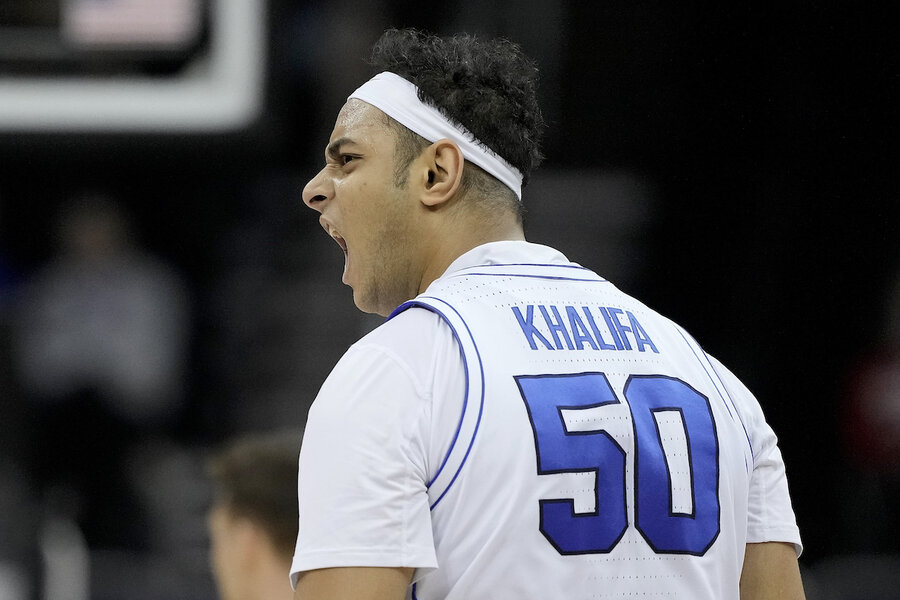Full heart. Empty stomach. Can’t lose. BYU’s star combines March Madness and Ramadan.
Loading...
| Omaha, Neb.
Aly Khalifa’s plan to start his day March 21: wake up at 4:30 a.m., a witching hour for a college kid if ever there was one, and roll out of bed for the same breakfast as always: scrambled eggs, yogurt, some fruit, all washed down with a whole lot of water.
It’s the last he was to eat or drink for nearly 16 hours.
Then he was to pray, prostrating in accordance with Ramadan, the holiest month for Muslims, not for leading Brigham Young University to victory in its game hours later against Duquesne but out of a profound sense of reverential devotion.
It is a fast Mr. Khalifa is embarking on willingly, yet one that carries with it unusual challenges during the NCAA Tournament. The energy the 6-foot-11 forward from Alexandria, Egypt, will expend on the court over 40 minutes cannot be replenished until much later in the day, after the sun mercifully drops over the horizon and darkness finally sets in.
“Not going to lie,” Mr. Khalifa said in a corner of the Cougars’ locker room March 20, having just stepped off the bus for practice at about the same time as tipoff will occur the following morning. “I’m real thirsty right now. That’s the hardest part.”
One of the Five Pillars of Islam is the “sawm,” where during the ninth month of the Islamic calendar healthy adults are required to abstain from food and drink during daylight hours. The practice is intended to renew their awareness and gratitude for all that God has bestowed upon them, and to serve as a reminder of their religious obligation to help those less fortunate.
There are exceptions for children and the elderly, women who are pregnant and those who are traveling, and that could have given Mr. Khalifa a reprieve. In fact, BYU teammates Fousseyni Traore, a native of Mali, and Atiki Ally Atiki, who was recruited to the predominantly Mormon school from Tanzania, chose to observe Ramadan in other ways, such as extended prayer.
Yet Mr. Khalifa wanted to fast in earnest, putting faith in God – and the BYU training staff – he could endure such deprivation.
Cougars coach Mark Pope has provided leadership and guidance. Michael Davie, the school’s director of sports science, has been meticulously monitoring his weight and hydration level. Robert Ramos, the director of sports medicine, is providing solidarity – “He’s doing it with me,” Mr. Khalifa said with a smile. “Rob was like, ‘I got you.’”
They had a dry run last week during the Big 12 Tournament, where the Cougars won a second-round game against UCF before losing in the quarterfinals to Texas Tech.
“We’re getting more comfortable with the schedule, more comfortable with the diet, more comfortable with the first thing he eats in the evening and how he rations it out,” Mr. Pope said. “He’s become way more comfortable. He’s had a bit more juice [energy] every day. He’s adjusted to it. I’m super proud of him. He’s an incredible example of faith and devotion.”
Cougars guard Richie Saunders, who has helped to raise money to build basketball courts in West Africa, knew Mr. Khalifa’s fast would be a tremendous sacrifice. But he also knew that a close-knit team that had successfully navigated its first season in the Big 12 to return to the NCAA Tournament for the first time in three years would be there to help.
They might need to play more minutes. Adjust their style. Provide emotional support, just as much as the physical kind.
“I knew that sacrifice for him,” Mr. Saunders said, “but we’re such a team of faith, all the different nuances or whatever. If that’s his choice, we’re going to be behind him. We’re going to carry him when he needs to be carried.”
“It’s a team,” Mr. Saunders said. “You know?”
Mr. Khalifa isn’t unique in the NCAA Tournament. Samson Johnson and Hassan Diarra of No. 1 overall seed UConn fasted last year, when the Huskies rolled to the national championship, and are planning to do the same as they defend their title.
So far, tipoff times have worked in Mr. Khalifa’s favor. Both of the Cougars’ games in the Big 12 Tournament started before noon, and their game against Duquesne on March 21 will begin at 11:40 a.m. That beats a game that would start in the midafternoon, when Mr. Khalifa’s hunger pangs and unquenchable thirst would be at their worst.
They won’t know until the night of March 21, assuming they win, when they will tip against Illinois or Morehead State on March 23.
“The built-in part of faith is that you kind of press forward with your acts of devotion,” Mr. Pope said, “and it’s inherent in that you have faith that God’s will is going to be done. I don’t think Aly is asking for any handouts. I don’t think our players in their walk of faith are asking for any accommodations or handouts. I think that defies the point of it.”
“One of the beautiful things about acts of devotion, which all of our guys on our team are incredibly familiar with, is that you kind of put your offering on the altar, so to speak – the figurative altar – and then you trust that God’s will is going to be done.”
This story was reported by The Associated Press.







